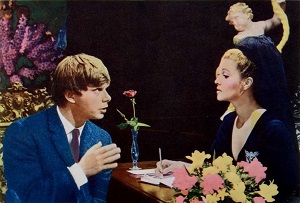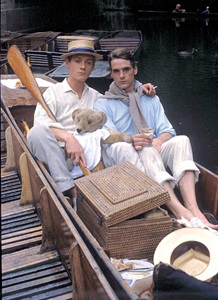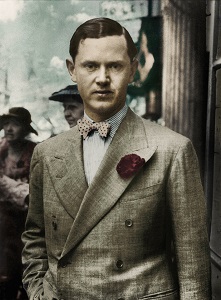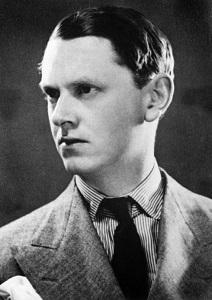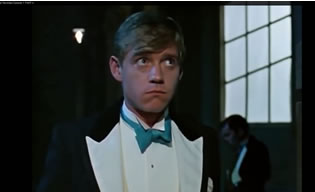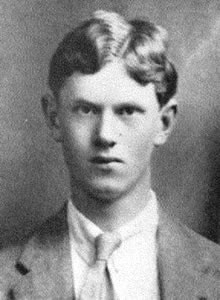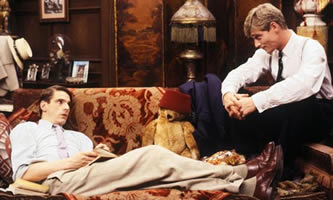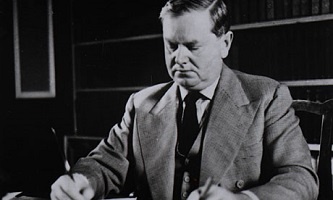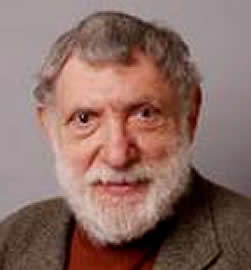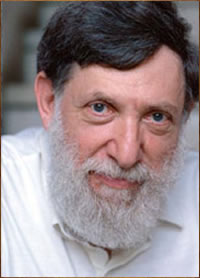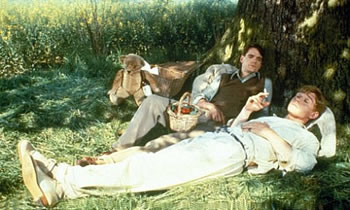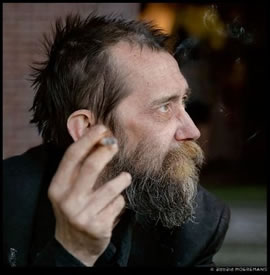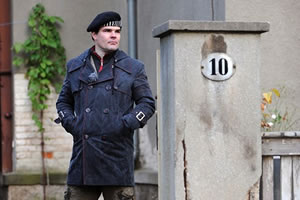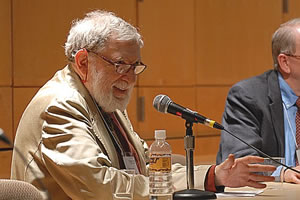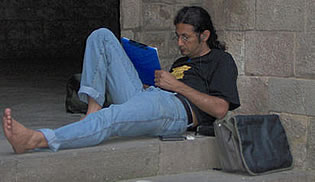De Duitse schrijver Uwe Tellkamp werd geboren op 28 oktober 1968 in Dresden. Zie ook alle tags voor Uwe Tellkamp op dit blog.
Uit: Der Eisvogel
“Vater bestellte mich in die Bank, wie es seine Art war: Er wusste, dass ich nicht ans Telefon ging, deshalb ließ er mir eine Nachricht zukommen, nicht per e-Mail oder Fax, auch nicht per Post, sondern per Fahrradkurier. Ich möchte dich sprechen. Ich kann morgen eine Viertelstunde erübrigen, warte in meinem Büro auf mich. Und ich wartete – nicht weil mir sein Befehl Wunsch oder ich ein besonders gutdressierter und gehorsamer Sohn gewesen wäre, mich interessierte, was er diesmal von mir wollte, und ich hatte Sehnsucht nach einem Gesicht: Willst du kein normales Leben führen, hatten Lippen zu mir gesagt, die ich bei einem früheren Besuch in Vaters Bank zum ersten Mal sah, damals, als ich im Vestibül aufgerufen wurde und der Empfangsdame folgte, deren Hintern in einem zum Zerreißen gespannten Kostüm vor mir die polierte Marmortreppe zur Chefetage hochschaukelte, dann die Unterredung mit meinem Vater: Wie sieht jetzt deine weitere Lebensplanung aus, Wiggo, hast du eine Stelle, hast du eine Freundin, dann klopfte es, herein, ja, Frau Toft … – ’t Hooft, sagten die Lippen, einer dieser für mich seltsamen holländischen Namen mit einem Apostroph am Anfang und kleinem Buchstaben danach. Die Augen glitten von meinem Vater zu mir, musterten mich spöttisch, dunkel wie Brombeeren, das Haar schwarz und glatt wie Vogelflügel. Ja, Frau ’t Hooft, entschuldigen Sie. Ihr Name ist nicht ganz unkompliziert. Bringen Sie die Dornier-Analyse? Frau ’t Hooft nickte, trat zum Tisch. Ich habe es soweit vorbereitet; aber einiges an den Beteiligungsverhältnissen ist noch unklar, könnten wir, sie sprach ohne Akzent. – In zehn Minuten, sagte Vater. Sie ging. Meine beste Assistentin, ehrgeizig, aber nicht zu sehr, kein Blaustrumpf, glaube ich, will auch Kinder, wie findest du sie? – Vater, hast du mich deswegen bestellt, um mit mir über deine Assistentinnen zu reden? – Nein, aber darüber, was du dir jetzt vorstellst, nachdem du es glücklich bis aufs Arbeitsamt gebracht hast, mein Sohn, wie alt bist du? Vater zündete sich ruhig eine seiner Cohibas an.”
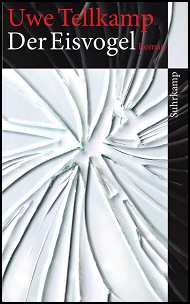
Uwe Tellkamp (Dresden, 28 oktober 1968)
Cover
De Duitse dichter, schrijver en theoloog Johannes Daniel Falk werd geboren op 28 oktober 1768 in Danzig. Zie ook alle tags voor Johannes Daniel Falk op dit blog.
Der Bäcker von Prag und die neun Strohwische (Fragment)
Eine Ballade
Graumäntelein ging, so grau von Gestalt,
Wohl durch den finstern böhmischen Wald,
Graumäntelein ging wohl über ein Jahr,
Der Mantel zerrissen und unscheinbar;
Der Regen beregnet ihn jeglichen Tag;
Er ging von Böhmisch-Brod bis gen Prag.
Und wie er gen Prag in die Hauptstadt kam,
Wo die Moldau mitten die Stadt durchschwamm,
Wo Heiligenbilder und d’runter erhöht
St. Nepomuk hoch auf der Brücke steht;-
Hell glänzen drei Sternlein über dem Haupt –
Daß selig das Volk wird, das an ihn glaubt;
Besucht’ er im Regen sein altes Quartier,
Tief unter’m Hradschin angebaut liegt’s hier.
Und der Nebel durchzog so finster die Stadt,
Und der Wanderer sucht im Nebel den Pfad;
Hier wohnt der Hussit, und der Christ und der Jud’,
und lebet geschützt vor Verfolgungswuth.
Und sieh’! vor der Thür auf dem Schemel da saß,
Verkaufend Semmel und Stritzel, Herr Clas;
Herr Clas, den Reichen und Armen bekannt,
Und der reichste der Bäcker in Prag nur genannt;
Wohl hielt er der Schweine sich hundert zur Mast,
Er selbst war dicker als alle sie fast.
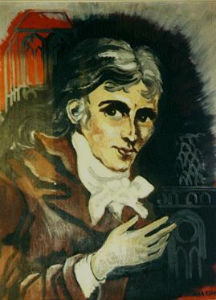
Johannes Daniel Falk (28 oktober 1768 – 14 februari 1826)
Portret door Hanna Kohlschein, z.j.
De Duitse dichter en schrijver Karl Philipp Conz werd geboren op 28 oktober 1762 in Lorch. Zie ook alle tags voor Karl Philipp Conz op dit blog.
Abendphantasie
Die Phantasie, des Himmels schönstes Kind,
Kommt auf Gewölk von Rosen hergezogen;
Der Abendsonne Zauberdüfte sind
Schon vor ihr her den Bergen angeflogen:
Romantisch liegt vor mir das kleine Thal,
Vom nahen Wall der Hügel still begränzet,
Um die ersterbend schon der letzte Strahl
Der Sonn’ im Kampfe mit den Schatten glänzet;
Die fallen jetzt hernieder in das Land;
Das Schauspiel dort der Ferne tritt zurücke;
Die Welt verengt an dichter Nebelwand
Allmählich sich des Spähers irrem Blicke.
Ein Schweigen, wie der Ruhe Schweigen, zieht
Sich rings umher durchs dämmernde Gefilde,
Auf das herab schon Hespers Fackel glüht:
Verschwunden sind vor mir des Tags Gebilde.
Die Nebel fliehn; der Sterne Welt geht auf;
Sie blinken Aug an Auge schon am Himmel:
Frey wandeln sie jetzt den gewohnten Lauf,
Den festlichen, in seligem Gewimmel.
Mein innres Licht wird durch ihr Licht erhellt:
Es tagt in mir; ich wähne, neue Augen
Gehn in mir auf, die Wunder jener Welt
Voll Pracht und hoher Schönheit einzusaugen.
Der Gottheit Strahl berühret mich und reißt
Mich hoch empor, weit über niedre Zonen
Hin wo der Quell der ewgen Wahrheit fleußt,
Und die Gestalten alles Guten thronen.
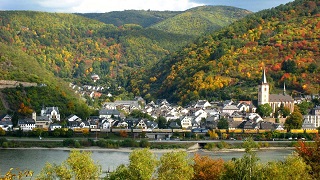
Karl Philipp Conz (28 oktober 1762 – 20 juni 1827)
Lorch
Onafhankelijk van geboortedata
De Nederlandse schrijver, essayist, journalist en columnist Arjen van Veelen werd geboren in Rotterdam in 1980. Zie ook alle tags voor Arjen van Veelen op dit blog.
Uit: En hier een plaatje van een kat & andere ongerijmdheden van het moderne leven
“Treinstations begonnen op vliegvelden te lijken. Er kwamen beveiligingspoortjes. Er kwamen steeds meer winkels. ‘De winkels geven het station een gevoel van veiligheid en comfort, gemak en zekerheid in een hectische omgeving, maar brengen ook sfeer en vermaak,’ schreef de NS.
Het was in diezelfde tijd dat treinconducteurs op omroepcursus moesten, waar ze leerden om de reiziger ‘persoonlijker’ toe te spreken. ‘Goedemiddag, welkom in de intercity naar Eindhoven’, of ‘wij gaan nog voor u stoppen in Venlo’. Let op dat ‘voor u’ – het stoppen van de trein, voorheen vanzelfsprekend, werd nu gebracht als extra service, een gunst bijna. En omgekeerd leerden de conducteurs om vertragingen voortaan ‘extra reistijd’ te noemen, als een onverwachte bonus. In die tijd verschenen er op de stations slogans als ‘Genieten’, ‘Prettig wachten’, ‘Verwen jezelf’.
Wachten werd genieten.
Genieten werd shoppen.
Het missen van je trein werd een belevenis.
Maar zomaar ergens zitten kon haast niet meer: bijna elk stoeltje of bankje in de hal hoorde nu bij een keten. Consumptie verplicht. De wachtende mens werd gekalmeerd met goede catering. Zijn wachttijd moest geen sleur zijn, maar een vakantie, een minibreak. Alsof je hier niet wachtte op de boemel, maar in de rij stond voor de achtbaan.”
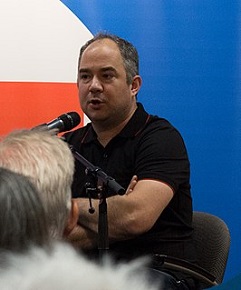
Arjen van Veelen (Rotterdam, 1980)
De Nederlandstalige dichter en schrijver Al Galidi (eigenlijk Rodhan Al Khalidi) werd geboren in Al-Najaf (een klein dorpje in het Zuiden van Irak). Zie ook alle tags voor Al Galidi op dit blog.
Vergadering
Waarheen gaat de Nederlander?
Naar een vergadering.
Waar komt hij vandaan?
Van een vergadering.
Het huis
is de vergadering van de Nederlander
met zijn hond.
De douche
is de vergadering van de Nederlander
met het warme water.
De slaap
is de vergadering van de Nederlander
met zijn bed.
Wakker worden
is de vergadering van de Nederlander
met de haast.
De vergadering
is de vergadering van de Nederlander
met de vergadering.
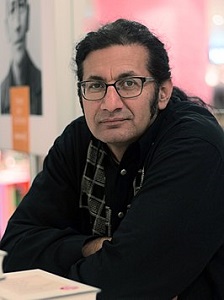
Al Galidi (Al-Najaf, 1971)

